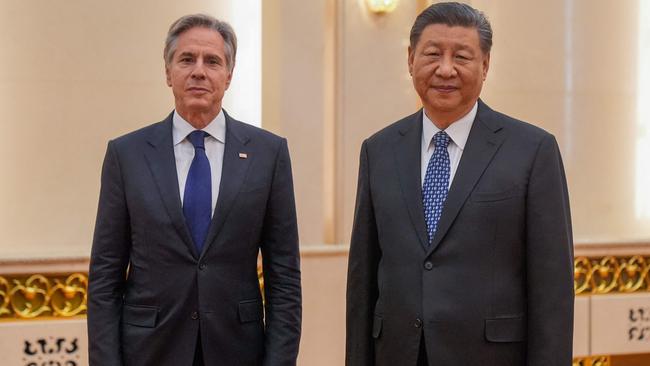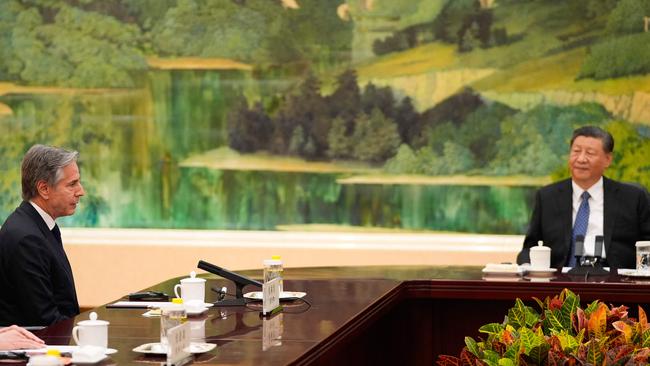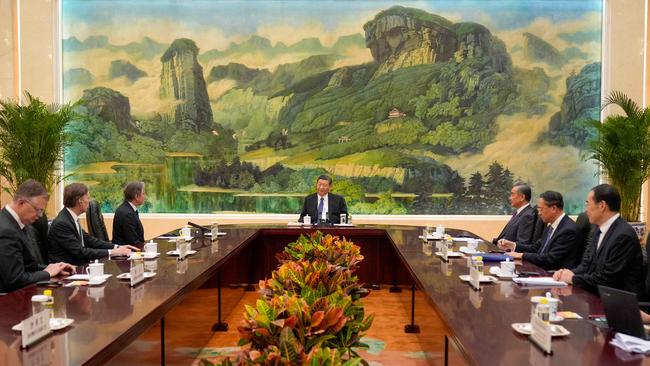Antony Blinken presses Xi Jinping on Russia help
Antony Blinken pressed Chinese leader Xi Jinping to cut back on his nation’s support for Russia’s defence industry during a meeting in Beijing.

US Secretary of State Antony Blinken urged Chinese leader Xi Jinping to cut back on his nation’s support for Russia’s defence industry during a meeting in the Chinese capital on Friday and warned that the US was prepared to act if Beijing didn’t heed its concerns.
“Russia would struggle to sustain its assault on Ukraine without China’s support,” Blinken said at the end of a three-day trip to China. “In our discussions today, I made clear that if China does not address this problem, we will,” he added, alluding to economic sanctions under consideration by the Biden administration, first reported this week by The Wall Street Journal.
Beijing has offered few indications that it will go along with the US demand, however, raising the potential for inflamed tensions between the world’s two largest economies ahead of November’s presidential election in the US
As Blinken met with Chinese leaders on Friday, a spokesman for China’s Foreign Ministry slammed US pressure tactics during a regular daily briefing as “extremely hypocritical and irresponsible.” The growing tensions over Russia represent a departure from what in recent months had been a steady improvement in US-China ties. Xi didn’t address Russia at all in his public remarks while meeting Blinken, instead reiterating his longstanding call for the US to view China more favourably.
“We hope the US can also look at China’s development in a positive light,” Xi told Blinken at the Great Hall of the People. “This is a fundamental issue that must be addressed, just like the first button of a shirt that must be put right in order for the China-U. S. relationship to truly stabilise, improve and move forward.”

A November summit meeting in California between Xi and President Biden led to the resumption of bilateral military-to-military contacts, fresh efforts to curb the role that Chinese companies play in the global trade in fentanyl and discussions on the risks of artificial intelligence.
During an earlier stop in Shanghai beginning on Wednesday, Blinken touted the importance of student exchanges and people-to-people diplomacy.
But as Blinken engaged in hours of meetings in Beijing on Friday with Xi and other top Chinese officials, there were an array of thorny security and economic issues, including China’s help in Russia’s push to revive its arms industry, China’s military posture in the South China Sea and differences over Taiwan.
US officials say that China has provided Moscow with optics, microelectronics, drone engines and other materials that, while not lethal weaponry, have nonetheless strengthened Russia’s military industry at a critical stage in the conflict with Ukraine.
In 2023, 90% of Russia’s microelectronics imports, important for the production of missiles, tanks and aircraft, came from China, US officials say. Beijing, US officials add, has also helped Russia improve its satellite capabilities for use in the war in Ukraine.
Raising the stakes, Russian President Vladimir Putin said Thursday that he is planning to go to China in May. That visit would mark Putin’s first foreign trip since his re-election in March and underscores the priority that the Kremlin places on expanding its security and economic ties with Beijing.

China has heeded Western calls not to provide arms to Russia and Blinken said that Beijing had cautioned Moscow against considering the use of nuclear weapons when Russian forces suffered battlefield setbacks during the first years of its invasion. But a brisk trade between the two neighbours in so-called dual-use goods, which have military and non-military applications, has boosted Moscow’s efforts to rebuild its military industry, which has been constrained by Western sanctions.
President Biden complained about dual-use exports in a call with Xi earlier this month. US officials, meanwhile, have encouraged European nations, which have extensive trade ties with China, to press Beijing on the matter as well.
The Journal reported this week that US officials were drafting sanctions that would cut off some Chinese banks from the global financial system if Beijing rebuffed its demands.
Meanwhile, in Astana, the capital of Kazakhstan, Russian Defense Minister Sergei Shoigu called Friday for Moscow and its Asian allies to increase the scope of their joint military exercises to counter attempts by the US to expand its security influence in the region.
Speaking at a meeting of the Shanghai Cooperation Organisation, a Eurasian security group founded in part by Russia and China, Shoigu warned that Washington’s intentions were unacceptable and aimed at destabilisation.
“Russian-Chinese military co-operation is an important element in increasing defence capability and maintaining global and regional stability,” Shoigu said, according to Russian state news agency TASS. He added that contacts between Putin and Xi “are at an unprecedented level.” Chinese officials have repeatedly complained that the US is seeking to hamper its economic development by limiting its access to advanced chips and going after some of its leading technology companies, such as TikTok owner Bytedance, while selling weapons to Taiwan.
“Overall, the China-U. S. relationship is beginning to stabilise,” Chinese Foreign Minister Wang Yi said at the start of his meeting Friday with Blinken. “But at the same time, the negative factors in the relationship are still increasing and building … China’s legitimate development rights have been unreasonably suppressed and our core interests are facing challenges.” Ukraine isn’t the only instance in which the US has accused China of protecting Moscow’s interests. Earlier this week, the US and Japan put forward a United Nations Security Council resolution to try to head off the deployment of a nuclear-armed antisatellite weapon that US officials have accused Russia of developing. That measure reaffirmed the 1967 Outer Space Treaty, which bans putting weapons of mass destruction in orbit.
The US criticised China for abstaining on the resolution, which Russia vetoed. “Despite our multiple attempts to forge consensus, China has shown that it would rather defend Russia as its junior partner,” Linda Thomas-Greenfield, the US ambassador to the U.N., said Wednesday.
One area where incremental progress was expected is counternarcotics. Curbing the global trade in fentanyl, which is the leading cause of death for Americans between the ages of 18 and 49, is a high priority for Biden during this presidential election year.
In the months since Xi and Biden met in California and agreed to restart joint efforts to combat the drug trade, the two countries have convened a series of high-level meetings on the matter, including exploring ways to co-ordinate law-enforcement activities.
“We appreciate the work that’s been done in the time since then to build that co-operation,” Blinken told China’s Minister of Public Security Wang Xiaohong during a separate meeting on Friday. “There is more that needs to be done to have a sustained impact,” he added.
The biggest sticking point is the role of Chinese companies in the production of chemicals used to make fentanyl and other drugs. For years, such chemicals, known as precursors, have been openly sold over the internet, creating a marketplace for drug cartels to connect with their suppliers.
China has been slow to impose limits on such chemicals, a source of frustration for US officials. In March 2022, for example, the U.N. Commission on Narcotic Drugs added three such precursors to a list of internationally scheduled chemicals. Member states were then required to implement corresponding rules at the national level.
Two years later, China still hasn’t scheduled the chemicals. In recent months, as US officials have urged China to more aggressively go after some precursor suppliers, Chinese officials at times have responded that they can’t do so because these people weren’t breaking Chinese law, said a person familiar with the discussions.
Instead, Chinese officials have issued warnings to domestic chemical companies against participating in the narcotics precursor trade in a bid to scare off bad actors.
Blinken on Friday called on China to regulate the chemicals in line with its U.N. commitments and prosecute those who make the precursors used to produce fentanyl.
China says the US is attempting to make it a scapegoat for its failures at home to curb the crisis. “Fentanyl is not a problem of China, nor is it caused by China,” the Foreign Ministry said ahead of Blinken’s visit. “That said, China has not stood idly by, but is willing to help the American people.”
Dow Jones



To join the conversation, please log in. Don't have an account? Register
Join the conversation, you are commenting as Logout